We're getting to your messages. Thanks for your patience🙏
Ecuador is one of the easiest countries to obtain a long-term visa. There are multiple pathways to residency and the investment is relatively low.
After reading this guide you should have all the Ecuador visa information you need to decide whether Ecuador is a viable long-term option for you.
You may even have 2 or 3 different residency visa options open to you. Once you've read this article, we suggest checking out our Ecuador Residency Visa Calculator to give you more insight into your visa options.
Please note that visa requirements for Ecuador change frequently and these changes are not always well-publicized (if at all). So, it's always best to check with an immigration lawyer or a visa facilitator first.
Let's touch on some basics visa facts:
Citizens from most countries, including the US, Canada, UK & Australia, do not need to obtain a visa prior to entering Ecuador as shown by the following map:
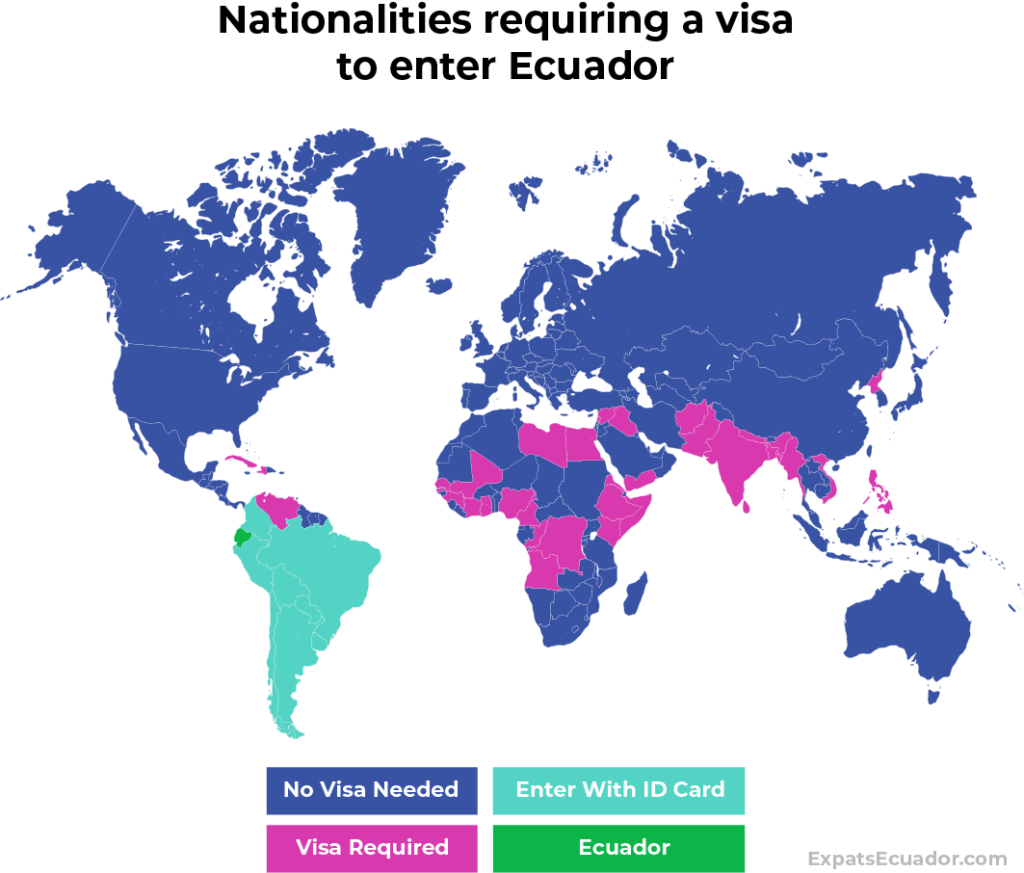
Nationals from the following 34 countries require a visa:
| Afghanistan | Angola | Bangladesh | Cameroon |
| Congo * | Cuba | DRC | Egypt |
| Eritrea | Ethiopia | Gambia | Ghana |
| Guinea | Haiti * | India | Iran |
| Iraq | Ivory Coast * | Kenya | Libya |
| Mali * | Myanmar * | Nepal | Nigeria |
| North Korea | Pakistan | Philippines | Senegal |
| Somalia | Sri Lanka | Syria | Venezuela |
| Vietnam | Yemen |
* Added on May 17 2021 (source)
Nationals from countries that do not require a visa can be issued a tourist stamp on arrival. This is valid for 90 days within a rolling year. Those 90 days do not have to be used consecutively.
This does confuse visitors, but it's relatively simple. Unlike many countries that use a calendar year, Ecuador uses your date of entry as the start of your 365 days.
For example, say you enter Ecuador on May 20, 2024. Then, you're allowed to stay 90 days until your year finishes on May 19, 2025. Here it's called chronological year. Be sure to check it in the immigration office, sometimes they stamp something in your passport, and then in the system they have another different day, one more or less.
You can come and go as you please, provided you haven't used up all of your 90 days.
No. Sorry. Border runs are popular in countries like Thailand and Vietnam where you can reset the number of days you're allowed to stay in the country by popping into a neighboring country and then returning.
As such, visiting Peru, Colombia or any other country will not reset your 90-day allocation.
Yes, you can extend for another 90 days relatively easily. After that, you can potentially even extend for another 90 days, you must request the extension between days 80-90 of your tourist visa, the extension has a cost of 153.33 USD, but if you request the extension after day 90 and before day 120 you must pay a fine.
The main types of residency visas popular with expats are:
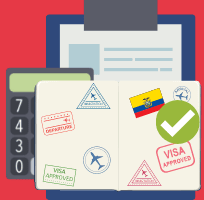
We've broken down each visa type, including the requirements and costs below.
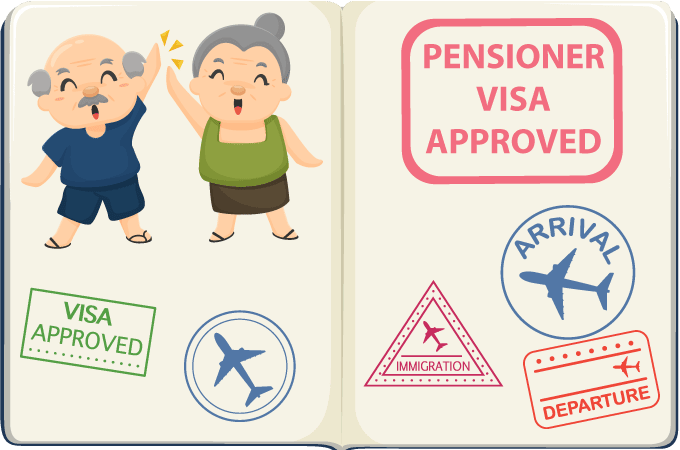
Ecuador's Pensioner Visa (or Retirement Visa, Pensionado, Jubilado) is the most popular type of visa for retired expats wanting to spend their golden years in Ecuador.
The main requirement is that you receive a guaranteed income for life. This is most often satisfied via regular social security checks, but it is not limited to this income source only.
You can also have income from other guaranteed sources such as pensions, annuities, superannuation, etc. But, the main point is that the income must be guaranteed for the remainder of your life.
If you are using Social Security, then you'll need to obtain an official letter from the Social Security Administration. This also needs to be signed and apostilled.
Dependants can also be included on a Pensioner Visa. This includes spouses, children, and grandchildren. However, this can be risky because it's tied to the primary visa holder. If something happens (i.e. relationship breakdown), then the dependents need to apply for their own visa(s). In the case of the death of the dependent, it is different, the dependent has 30 days to notify the Ministry and deliver the death certificate. Otherwise, you will lose your immigration status.
The law was changed in March 2023 to make this visa even more attractive. They reduced the amount for the application to $270. You will need the additional $200 income requirement for each dependant.
This makes Ecuador one of the most expat-friendly destinations for retirees wanting to maximize their social security.

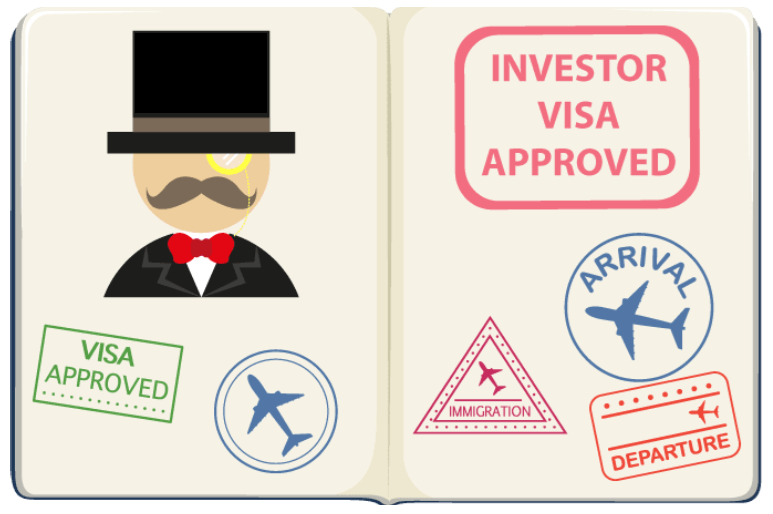
Low investment amount of $46K
More flexibility to spend time outside of Ecuador
High CD interest rates of 8-9%
Property investments also count
$46K is tied up for the duration of your visa (2 years)
Hard to get money out of CDs (or property) if needed
But a good advisor can help you by resolving these doubts.
Ecuador's Investor Visa (or Real Estate Visa, Inversionista) is popular amongst expats that don't receive social security benefits.
The two main pathways are:
There's also the possibility of other investment options such as investing in an Ecuadorian business, but we're going to only focus on the 2 popular pathways listed above.
This is generally the preferred option because it's a whole lot easier and less risky than purchasing a property.
The best part about Certificates of Deposits (CDs) in Ecuador? The high interest rates of course. The most popular banking option in Cuenca (JEP) currently offers 8% as their standard rate. Obviously, the rate changes, but you should expect significantly higher interest rates than in the US etc.
Of course, all investments carry risk and this one is no different. Many banks and cooperatives that offer CDs do have protection up to $32,000. But, as the minimum CD amount is $46,000 this still leaves $14.000 unprotected if something does happen.
And no, you can't mix and match your CDs at different institutions in an effort to ensure all the $46K is protected. It needs to be one CD.
You can't touch the principal amount for the duration of your visa (i.e. 2 years initially). However, you can take out the interest or just let it compound so you have yourself a nice little bonus at the end of your two years.
ie At the end of two years @ 8% interest:
Your inversion is $46k, then the 8% will be $7360 USD. This will provide you with a total of $53.360, Your profit on the original investment is considerable. Not bad at all. Time to treat yourself to a little shopping holiday!
When setting up your CD make sure you take notice of the terms and conditions. Especially the default roll-over provisions should you want to request your money back. You'll likely have a very limited window as the term of the CD expires to request your money or you may have to wait another term. It's VERY difficult to try and obtain your money mid-term. We aren't talking about penalties for early withdrawals, it's more along the lines of "Sorry, you can't access your money. Period."
Ecuador has some of the most affordable property prices for expats. This can make it very tempting to kill two birds with one stone by buying yourself an affordable property that you can also use to obtain your Investor Visa.
However, buying property in Ecuador is very risky and not something we generally recommend unless you really, really know what you're doing & have already lived here for at least a year. A buyer’s agent service like this one can help you navigate the process with confidence.
Ecuador is a very different property market than what you're used to. It's very easy to get burnt and can be frustratingly difficult to sell.
If you do decide to go down the property path, note that it isn't the purchase price that matters. It's the assessed value (i.e. the amount you pay tax on) that needs to be over $46.000 plus an additional $200 for each dependent attached to the visa.
Other popular residency visas generally only allow you to stay outside of Ecuador for 90 days. However, the Investor Visa does not have any restrictions on how long you can stay outside of Ecuador and still maintain your Investor Visa.
This can be a significant advantage for seasonal or 'bluebird' expats who like to escape their cold North American winters in favor of Ecuador's more temperate climate.
The main caveat is that if you're considering eventually applying for permanent residency (and eventually citizenship), you don't have to leave the country for more than 90 days in the 2 years, you can start the process by the 21 continuous months in Ecuador. Then you'll be limited to a maximum of 180 days each year for the first 3 years of your permanent residency.
So, if you aren't considering permanent residency or citizenship, then it might be best for you to re-apply for an Investors Visa every two years. Yes, this will mean more paperwork and costs over the long-term, but that might be a small price for having Ecuador as your second home.
If you do decide to leave Ecuador, you should be aware of the current 5% exit tax on cash leaving the country. There has been continuous talk of removing the tax, but until it actually happens you should be prepared to lose 5% on any capital leaving Ecuador.
Now, if you've had your money earning 8% interest for two years, then you're still going to come out significantly ahead. But it's still a hit to your hip pocket.

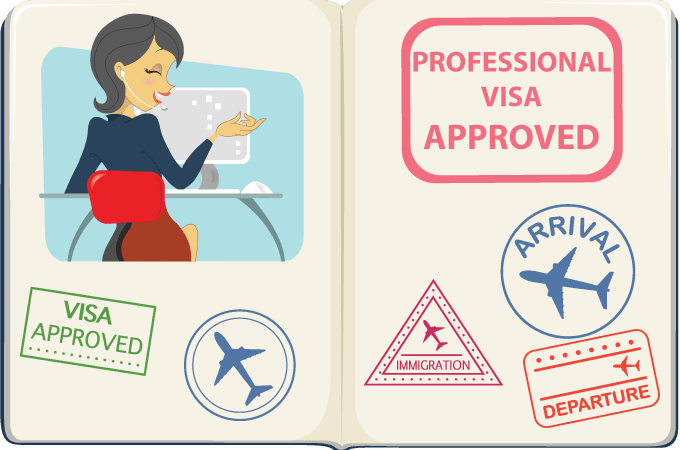
Ecuador's Professional Visa is the most popular choice amongst younger, university-educated expats. I have this visa and it's served me well.
This is a very flexible visa because the only significant requirement is that you have a bachelor's degree (or higher). The idea is that professional migrants will help the Ecuadorian economy.
You don't need any post-graduate experience in your chosen degree or work in that field in Ecuador. Nothing.
The most difficult part of the process for me was registering my degree with SENESCYT. They made me jump through numerous bureaucratic hoops before they would accept my degree.
The problem? They had issues with my Mode of Study Letter and wanted to be sure that my degree was taken in-person and not online. I did study in-person, but because I studied two degrees and my transcript didn't differentiate between them, they had a hard time satisfying themselves that the singular degree I wanted to register was taught in-person. This took many emails between my university, SENESCYT, my facilitator and myself before it was finally resolved.
The main take away is that if your visa application doesn't fit perfectly into how they want it, then you will face delays and possible rejection.
You do need to provide evidence that you're receiving more than $460 in income each month. But, printouts from your Internet banking suffice and they don't need to be apostilled, translated, or notarized (phew).
We've previously covered the requirements and process if you need more details on how to obtain a Professional Visa.


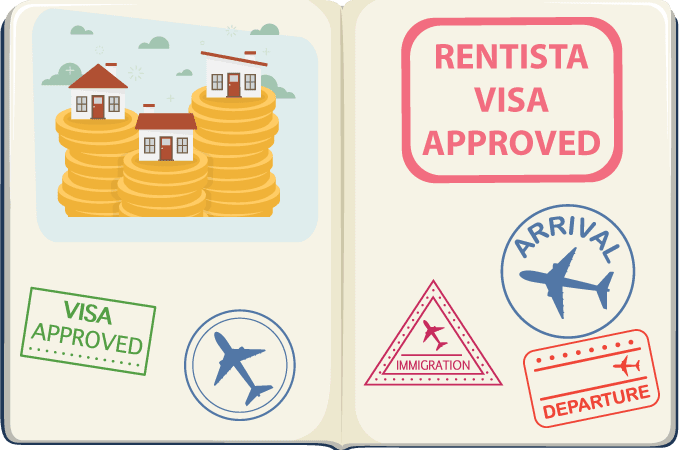
Ecuador's Rentista Visa is similar in many ways to the Pensioner Visa. The main difference is that income from the Rentista Visa does not need to be guaranteed for life.
You only need to prove that you have $1380 of recurring income from a legal source. Common sources include property leases and investments such as annuities. You may also qualify for this if you have an employment contract that continues whilst you're in Ecuador.
The evidence you provide (ie lease agreement) needs to be apostilled in your home country before being translated into Spanish and notarized in Ecuador.
Income can be from inside or outside of Ecuador.
The biggest challenge with this visa is that it's relatively new and unproven. There are a lot more applications for the Pensioner, Investor, and Professional visas. This uncertainly also means that the requirements are not necessarily consistent across each visa processing office.

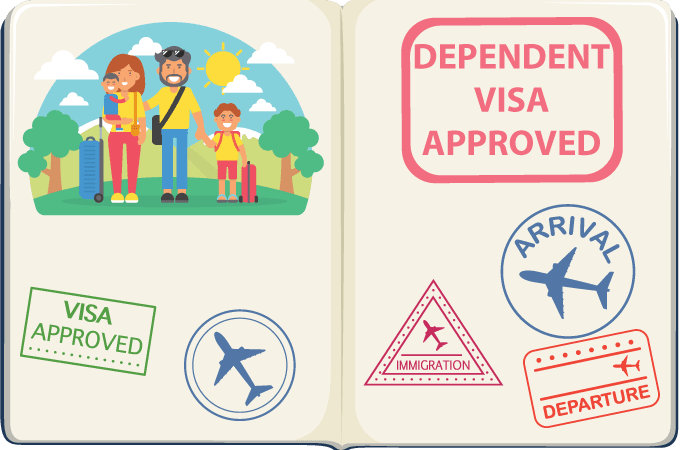
Ecuador's Dependent & Marriage Visas come under the broad category of Amparo visas.
The biggest difference with this visa is that you're pigging backing off someone else's legal residency. The three most common scenarios are spouses, children and marrying an Ecuadorian.
In the case of an expat married couple, then one person needs to qualify for a temporary residency visa (ie Pensioner, Investor, Professional, Rentista etc) and the second person applies as their dependent.
This can be very useful if the second person does not qualify for a temporary residency visa on their own. ie Perhaps you're an older married couple, but only one of you receives social security to qualify for the Pensioner visa.
You'll need to prove your married by having your marriage certificate apostilled in your home country. But, you only have 6 months from the date the certificate is apostilled to submit your application - the clock is ticking! And then it will need to be notarized and translated once you're in Ecuador.
If possible, it's generally better for each person to apply for their own visa. Why? Because if something happens to the primary visa holder, then the dependent is stuck and will need to apply for their own visa to remain in Ecuador. Not an ideal scenario, especially so given you've just been through a stressful life event. No need to pile on. You should know that if the primary visa holder dies, you have a period of 30 days to notify the Ministry, in order to give legal continuity to your visa, you should think about what your next step will be for a next visa in case you do not have the requirements. If you do not notify, your visa will be canceled and you will have to leave the country within a maximum period of 30 days.
Another common scenario is using the dependent visa for minors that are under the care of the primary visa holder.
In this instance, you'll need to provide an apostilled birth certificate from your home country and apply for the visa within 6 months. If you fail to submit within 6 months, you'll need to provide another apostilled birth certificate. Again - better to have this translated and notarized once you arrive in Ecuador.
If your child was born in Ecuador, you can go directly to the permanent protection visa, you just have to show your child's birth certificate and have all the additional documents as required by the dependent visa.
Marrying an Ecuadorian citizen won't automatically grant you citizenship. You still need to apply for a visa. The biggest difference in this circumstance is that you can skip the temporary residency requirement and go straight to permanent residency. Yay!
You'll need to provide your Ecuadorian marriage certificate or in the case of a de-facto relationship (union marital de hecho)- a certificate confirming you've registered your de facto reunion in Ecuador.
The documents and process for getting married in Ecuador is a topic for another day.
If you're all trying to apply for the residency visas together, bear in mind that you may need to have the primary visa holder's visa approved before you can apply for any dependency visa(s).
This can significantly increase the total processing time as it generally takes 2-3 months for each visa to process. So, you're looking at around 6 months total for all visas to be issued.
The additional timeframe shouldn't be a significant burden if you're on the ball and have planned ahead, but it certainly throws a wrench in any last-minute visa planning.
The visa fees for dependents are currently $200 - or half of the primary visa holder's fees. This fee is only payable once the visa is approved.
The application fee remains the same ($50).
On top of proving income for the primary visa holder, you'll also need to show $460 income (the month before application). This can be proven by printing the last month worth of bank statements from your Internet banking which does not need to be apostilled, notarized, or translated.

On top of the specific or 'special' requirements for each of the temporary residency visas included above, you'll also need to provide the following requirements that are mandatory for all Ecuadorian temporary residency visas.
Download from the official immigration site.
This needs to be completed in Spanish and witnessed by a notary.
Whilst the official requirement is that your passport is valid for 6 months, we recommend having at least 2 years (ie the duration of the initial visa). Why? Because it can be a real hassle to try and transfer your visa to a new passport and cost another $100 to transfer your digital visa to a new passport number.
This can mess up the entire process if you don't plan properly. Your background check should be completed at both the state and national level which can take time.
If you’re a US citizen you will need FBI and State police report, you must be sure that the document is issued in the same state where you obtained your driver's license.
You only have 6 months from the date the background check is issued to apply for your visa. And, you need to have them apostilled during this time too.
Then, once in Ecuador, they need to be translated and notarized.
You need to show proof of health insurance for the process. This can be private or public health insurance.
But, you'll only be able to apply for public health insurance (IESS) once you have your cedula.
So, your best option is to obtain private health insurance just before you apply. You only need your passport to apply. The cost varies on numerous factors such as age and smoking habits, but factor in about $100/month for this.
Make sure you obtain a letter from your health insurance provider stating that you're covered and the period of coverage and it must indicate that the insurance protects you for the duration of your visa.
Get this from the Immigration office for $5
On a white background. Neutral face or natural smile accepted.
You'll need to have most of your documents notarized, and those that aren't in Spanish will also need to be translated first.
There are many notaries in Ecuador and they now charge set prices for each service, but you can consult with your facilitator, they know perfectly how to do this process.
Fees for Ecuadorian temporary residency visas are:
This applies to all of the visas mentioned in this article except for the dependent visa that has a reduced cost of $200 for the visa fee. The application fee is the same at $50.
On top of the visa fees, you'll also need to pay for:
How much you're going to pay is going to depend on individual circumstances such as: how many documents you need to have apostilled, translated and notarized.
Translations and notaries are readily available in Ecuador for a reasonable fee. Budget $100+ for this.
Postage fees can also add up. If you're not aware, Ecuador no longer has a public postal service. So, you'll need to use private couriers like DHL and expect to pay $100+ to send a document.
So it makes financial sense to try and bring as many documents with you to Ecuador as you can just prior to submitting your application.
If you decide to use an immigration lawyer or visa facilitator, then you'll need to budget for this too. Fees vary by provider and some include variable costs like notarizations and translations in Ecuador.
Expect to pay around $1,000 in legal fees for an immigration lawyer to prepare your application.
There are many small steps involved before you'll receive your Ecuadorian temporary residency visa. Expect the process to take approx 4 months, but just know that there are many variables that will impact total processing time and few that you can control.
The process for applying for temporary residency is:
The short answer is yes. The requirements change often and the process itself takes around 4 months even if you've submitted everything perfectly.
If you make a mistake and your visa gets rejected, you may need to start all over again - including getting your documents apostilled once more!
I initially tried to obtain my professional visa on my own. I took two long trips to the Ministry in Quito to try and understand the requirements and process straight from the horse's mouth. Both trips were a complete waste of time for me as I was just shown the exact same incomplete information from their website. It didn't include any of the finer details I really needed to know.
So, I gave up and used an immigration lawyer that was recommended to me.
My story is not unique. Many others have had similar difficulties when trying to complete it on their own. If you want to DIY then I'd recommend only doing so if you speak Spanish at an advanced level and have experience dealing with the inefficiency and frustration of Ecuadorian bureaucracy. Even then I'd recommend having an Ecuadorian friend go with you.
My Ecuadorian partner did try to help me, but she doesn't know the immigration system and so we still needed to get legal assistance.
I chose these visa professionals. You can contact them directly here.
They’ve processed over 5,000 visa applications and I had an easy process with them.
Yes. Unlike many countries that don't allow you to upgrade from a tourist visa to a more permanent visa, Ecuador has no problems with it. I'd argue the best way to apply for your visa is whilst on tourist visa (or an extension).
Yes, you can. Just note that some of the processes will change from outlined here.
Yes. Your visa fees are reduced by 50%.
It can. Obviously it depends on the gravity of the offence and whether your explanation is reasonable. I'd definitely be engaging legal advice if you have doubts about this.
Ecuador's generous visa program is suitable for a wide range of wannabe expats. From pensioners to young professionals and even investors, there are suitable pathways for many that want to come and enjoy Ecuador on a more permanent basis.
Just do your research well (you are if you're reading this!), pay attention to the time constraints, and don't be afraid to reach out for legal assistance should you have any doubts.
Did we leave anything out? Please comment below if we have so we can update if required. We'd also like to hear about your experience applying for residency visas in Ecuador.
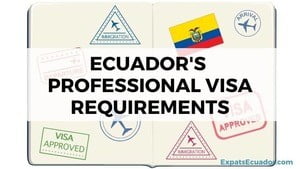


Thanks for all the info...I do have a question. I have a rentista permanent residency visa and because of co vid inconveniences I have been outside of Ecuador for 14 months. How long can I be outside of Ecuador consecutive time and still maintain my visa legally.. I can not find this info online.
Thanks in advance for the answer.
Hi Lou - how long ago did you get your permanent residency?
Within the first 2 years, you're only allowed to spend a maximum of 180 days outside of the country. You'll need to pay a fine if you spent more than 180 days and wish to keep your residency. They do have a clemency period because of COVID, which could act to extend the time you're allowed outside of Ecuador. I was stuck outside of Ecuador for an additional 4 months, but I know this isn't an issue because it was during the COVID clemency period.
For years 2+, you were previously allowed to spend up to 5 years without entering Ecuador, but this has very recently been reduced to 2 years. You can see the visa changes in more detail.
Hi Jason,
Thank you for your time and generosity in keeping this site so well informed and up to date!
If I may, I have a question about my visa options.
My temporary work residency expired in June, and I’m now in the process of applying for PR. I’m married to an Ecuadorian. Though, with the new regulations I’m concerned I may lose this residency in the first 2 years. My husband and I will be be going back to Canada within the first year I would receive the residency, probably coming back to Ecuador once a year for a few months.
This means I will be out of Ecuador for more than 180 days in the first 2 years of my residency. Will this just mean I pay a fine, or will I lose the residency completely?
Are there other options for someone who is married to an Ecuadorian? I don’t think I qualify for temporary residency anymore since I am no longer working in Ecuador. Professional visa seems like it’d be a hassle since my university degrees aren’t recognized by SENECYST.
Thank you in advance for your insight!
Saludos,
Alex
This is great information that is hard to find anywhere else! Based on the information, what would be the benefit of getting a "Professional Visa" over a "Rentista Visa" given the additional documentation required for the Professional Visa?
Thanks for the kind words Greg. The advantage of the Professional Visa is that you don't need to prove at least $400 guaranteed monthly income for the duration of your visa (ie 2 years). But, you do need to fulfill this for the Rentista Visa - it's the main requirement. The main requirement for the Professional Visa is that you have a university degree. They'll still ask to see proof of prior income, but they don't need to see any official documentation that this income will continue over the next 2 years. Does this clear it up for you?
Thanks. I'm a little confused. Up above, under "Professional Visa Requirements" you state "Can prove $400 minimum monthly income". Is the difference "guaranteed income" from an official pension program for life vs. showing "general income" from any source?
Hey Greg - 'Guaranteed income' means you have a contract that covers the minimum value (currently $400 per month) for the duration of the visa (generally 2 years for temporary residency). If this income is from Social Security, then the Retirement Visa is best suited. If it's from any other source, then you can look at applying for the Rentista Visa.
For the Professional Visa, you don't need guaranteed income, but you'll still need to show you have enough money to support yourself via current bank statements etc. This is generally a much easier requirement to satisfy.
Got it. Thanks fr clarifying!
Thank you for the information. My question, we received our investor visas and cedulas in 2014. We have been here near 7 years. We are considering selling our home but instead of buying, we may rent. Will the visa process start completely over? Will we again need marriage certificate and FBI background? Go thru a temporary visa phase. Thank you in advance.
Great article Greg. How do you open a bank account if you don't have s resident via yet?
Some banks/cooperativas do allow you to open a bank account with just your passport. JEP is a popular cooperativa amongst expats that does allow new accounts with only a passport. Feel free to check out our article on transferring funds into Ecuador for a more thorough breakdown of your options.
Hi, great content! I just wanted to point out a typo. It's SENESCYT not SENESYCT.
Could you point to more info on the requirements of a visa de amparo for a spouse of someone with a 9V (profesional)? I'm not sure wether i need to just apostille and translate our marriage cert or if i actually need to inscribe it in the Registro Civil as well. We're both foreigners but I am a 9v holder. Thank you!
Thanks for the heads up on the typo Jane 🙂
You'll only need your foreign marriage certificate apostilled and translated as you're both foreigners. If you were marrying an Ecuadorian, then you'd need it registered.
Hola! Thanks for all the wonderful info. I just have one question. If I get a retirement visa, can I own & operate my own business?
Hey Yvonne - our pleasure. Yes, you can operate a business here whilst on a temporary residency visa. But, you'll also need to satisfy other requirements such as obtaining a RUC (ie Tax ID for the business). There's quite a bit of compliance you'll need to adhere to, especially if you start employing others. I'd suggest finding a good bi-lingual accountant to set this up properly for you.
Hi. I've enjoyed reading some of the articles.
Unfortunately, the link for signing up for the newsletter doesn't appear to be working. Can you sign me up?
Cheers,
Frank
Thanks for the heads up Frank. Sure thing. I've added you and updated the broken form. You should have just received an email. Have a great weekend.
Hi Jason,
Great information and very helpful.
I wanted to ask you about the investor visa, that if you buy property and become a permanent resident but then one day sell that property, do you lose the residency unless you buy again or is it, that once you have it, you have it?
Thank you so much for your help.
David
You're welcome David. The investor visa is attached to the property. If you obtain permanent residency and then want to sell, you'll need to transfer to a different visa type BEFORE you sell it or you'll lose your permanent residency status and have to apply for a new visa.
You'll have the entire value of the investment locked up for the duration of your permanent residency investor visa. This is one of the reasons some prefer to invest $40K in a certificate of deposit instead. Your initial deposit is still locked up, but you're free to take out the interest - it's pretty high too at around 8+%.
Due to Covid I decided not to work and look after my mother who required extra care during this time.
Now that I am looking to finally move to Ecuador I have decided to bring her with me as she has aged quite some during this time. My mother has a Pension so it is easy for her to qualify however I won’t draw my pension for a few years from now. My money is all tied up in investments that I prefer not to divest at this time.
What I wanted to know is can i get a contract signed by my mother that I am her caretaker and that I have an income from looking after her full time. I already have a place to live but the property is share with another person and even though we have invested lots of money into the property it is still pretty well listed with the city as what we paid for the land many years ago which is not enough to use for the visa plus we are looking to sell at some point to move to another area.
Basically I would like to have my mother be my source of reoccurring income for a Visa. I don't want to sell my property here and I mostly get my income at this time from stocks I invest in so I don’t want to divest to come up with the 40000 US dollars to put into the bank there
Hi Kalina, thanks for your comment. Rather than you trying to apply for your own visa (which may be difficult), I suggest it would be much easier for you to apply as a dependent visa with your mother as the primary visa holder. Adult dependents still qualify for a dependent visa.
A question to this information. I will be retiring after next school year. My daughter is 26 but has not been working since she is helping me post covid. I know I can get the retirement visa. Can she apply as my dependant? She was adopted at 1 year old. Would I have to get all her adoption information translated? She was born under a different name and was renamed. This was done in the Mariana islands - a commonwealth of the US. Just asking. Thank you.
Thank you for all this wonderful information (including the recent updates)! For the Professional visa, I heard Joseph say in the video that an Associates Degree would be sufficient. Your graphic says that a Bachelors Degree or higher is required. Do you know how to confirm the minimum degree required? Thank you!
Thanks for picking this up Holly! That was my mistake. I honestly forgot about associate's degrees whilst writing this article. Joseph is indeed correct - associate's degrees are valid and I've updated the article to reflect this. You can confirm by going to your closest migracion office 🙂
Excellent news, thank you very much Jason! And again, thank you for all the valuable information you are sharing. It is extremely helpful and greatly appreciated.
how can i apply for iess insurance and what are the other private health insurance companies in ecuador ?
Hey Dale - our comprehensive health insurance article covers these questions & more.
If I have the investment Visa is there any benefits like the pensioner Visa for example is the 50% off flights available to the investment Visa?
Hey Rob & Linda. Great question. I believe the 'tercera edad' discounts are available to cedula holders over 65 - regardless of which visa you have. I know they recently announced 50% discounts for mobile phone plans, but I'd need to research all of the discounts available (good topic for another article).
Thanks for all the useful information!
I have a question. I am a US citizen with a US passport. However I am already an expat, living in Japan for the past 8 years. I want to relocate to Ecuador from Japan,l. Should my documents (background check, fingerprints, police report etc) be from my current country of residency (japan) or my home county (usa)?
Thanks!
Hey Starr - you're welcome. Documents from USA should suffice if that's the passport you'll be using to apply.
Can you please give the requirements to migrate from a temporary investment visa to permanent residency?
I have a two year visa that I have already renewed once. I left the country for five weeks and have been in Ecuador for a consecutive 21 months. My wife is a dependent and will likely apply for her own permanent visa this time around. Thanks!
Hi Jason,
I am a permanent resident in USA but due to my nationality will need a visa to enter Ecuador. I am totally lost on what is needed for a tourist visa. I tried calling different consulate office but had no luck. I would really appreciate if you can provide me with the list of documents needed and the steps required to get a tourist visa. Thanks a lot!
Hi there. I also would like to know the requirements to apply for a permanent visa.I already have a professional visa and soon I will be here for 21 months. I also want to know if I need to go to a notary to translate my bankaccount documents. Thank you.
Hi Ger - I responded to your email enquiry. Cheers
Thanks for writing this article and for all the hard work you put into this webpage.
I went to the immigration office at Cuenca Airport because I wanted to know which date I shall apply for the extension.
(I just wanted to be well prepared, there for I went there)
I was very surprised with the answer I got there, because I was planning to stay in Ecuador for 6 months.
My case is this:
I arrived in Ecuador February 3th 2021, and I left Ecuador / went back to my home country April 13th 2021
(from February 3th 2021 until April 13th 2021, that was a 70 days stay in Ecuador)
And then I came back to Ecuador here on October 12th 2021.
I don't speak Spanish yet, and the lady at the immigration office spoke very little english.
She wrote down on a piece of paper in Spanish, and I translated the text, which says that I have to do the extension on November 4th 2021.
(in other words, the lady wrote that I shall come back to the immigration office November 4th 2021, if I want to apply for the 90 days extension, which I want to do)
But I thought that I got 90 days on arrival in Ecuador, but because I have already been here earlier this year, then they count those days.
Now all my plans have changed, so I have to go back to the cold winter in Sweden earlier than I was planning to.
I wish I knew about that rule before I came here.
When I do the extension on November 4th 2021 (like the lady at the immigration office wrote on the piece of paper) then I get 90 days, which I guess means that I have to leave Ecuador on the 1th February 2022 (from November 4th until February 1th 2022, that's around 90 days)
Please let me know if I'm correct or if there's something I have misunderstood, in terms of the visa rules above.
Thanks in advance.
Hey Charlie - you have quite unlucky timing. Your 90 days allocation is reset every 365 days (from date of 1st entry). This means your new 90 day allocation is Feb 3 2022 - ie 2 days after you need to leave! So, one suggestion is to leave Ecuador for a week or so (via air right now as borders are closed) before you apply for your tourist visa extension. Then, apply for your tourist visa extension ensuring it will last until your new 90 day allocation in Feb 2022. Confirm this plan (and your dates) with migracion first though.
As I understand it, you need to make a deposit at a bank in order to get your investor Visa. However, you need the Visa in order to make the deposit at the bank. It seems that one must precede the other. Please help.
Hey Steve - it is possible to open up a CD account with only your passport. You may need to shop around at different branches etc as some are easier to work with than others. Feel free to ping me if you get stuck.
I just reached 51 years old and ready to retire in Ecuador on my own funding, which is adequate enough to sustain me easily with (an indexed) US$2000+ for every month untill I reach my pension age and will be getting monthly pension as well from 68 years old.
Meaning I can put US$40.000 in an Ecuadorian bank or buy property as well on top of my monthly funding.
However....I think you're getting my point, when I resign there is no form of monthly income, other then my funds.
How would you suggest handling this combined with the visa possibilities?
Hey Marc - you potentially have a few different residency visa options. The Rentista might work for you depending on the type of funds you have. Feel free to ping me for a list of requirements here.
Just wanted to say your site is incredibly helpful and you answering all these questions is an absolute blessing. Thank you for taking the time.
Thanks so much for the content! It's amazing. I have been hearing about a Digital Nomad Visa recently. Do you know if this has gone into effect?
Not yet Ryan. You'll definitely see an article come out from us when it's live. We've been waiting on it for a while. There were a whole bunch of visa changes announced over the last couple of days and I was hoping this would be included. Sadly, it wasn't.
Jason, I am currently in Ecuador and would like to get a work visa. I do not have a degree. Can I get a work visa buy running my own business, restaurant, gift shop, ect? Any other ides how to get a work visa. Are they for 2 years? Thanks, Jason
Hey Jason - some expats do purchase businesses here and they qualify for the Investor Visa. Need to invest over $42.5K to be eligible. But, if you do go down this path I suggest it may be best to investing a Certificate of Deposit and gain 8-9% interest. This also qualifies for investment visa (same amount to invest; $42.5K).
A pure work visa will require a company to sponsor you. And, they'd need a very good reason to do so as the process is a little painful. Unless your skills are in very high demand, then I can't see it working out.
I found this blog very informative, keep up the good work. Thanks for the opportunity.
Hello! Is new rule gif a permanent visa requires to stay in Ecuador for 21 month within 2 years?
Hi Albina, to obtain your Permanent Residency you do need to be in Ecuador for 21 months within your 2 year temporary residency period.
My family and I want to stay for 6 months. It is my wife and I, and two children. I have a bachelors degree. What do you think would be best?
Hey James, 6 months is very easy for most tourists. Initial 3 months upon entry and can then extend after those initial 3 months. You only need to look at temporary residency if you want to stay longer than 6 months.
Hello, Thanks for the incredibly informative and detailed website. I'm unclear about the "Special Tourist Visa". You mention that a "Special Tourist Visa" of 180 days is available every 5 years. Am I reading it correctly that it is only available after using the 90 day extension of the entry visa? In other words, it amounts to being a full year as a tourist? Or, can I apply for the "Special Tourist Visa" in advance of travel? We want to be free to stay in Ecuador for 4 or 5 months and would ideally like to enter the country from the outset with a visa that easily covers that time period. Is that possible? Thanks in advance.
Hey Connie - you can easily spend 180 days in Ecuador each year without the need for a complicated visa. You get 90 days on arrival and can then easily extend for another 90 days. The process to extend is very easy - but feel free to reach out to us if you do want help with it and we can put you in touch with a facilitator. FYI - The Special Tourist Visa no longer exists (looks like I may need to update this article).
I have visited Cuenca for 2 weeks and have decided that Ecuador is my retirement home. I have not yet decided on a place to live although I love Cuenca, ..I am considering Vilcabamba or Banos. I have a pension but have not yet applied for social security although I'm eligible. I also have investments and savings. My concern is more about the background check as I have a non-violent conviction. I do NOT want to go through this process/expense only to be rejected!I realize I could come and go but I need a place to settle at 62 years of age. Wish to sell my home in central NY state but need to get my affairs in order so I won't be living in hotels!
Have you heard anything about the ISCED certificate? I came across one website claiming this needs to be apostilled and also notarized by the registrar office of the university. I can not find any other information about this document or any case of people using them for recent professional visa applications.